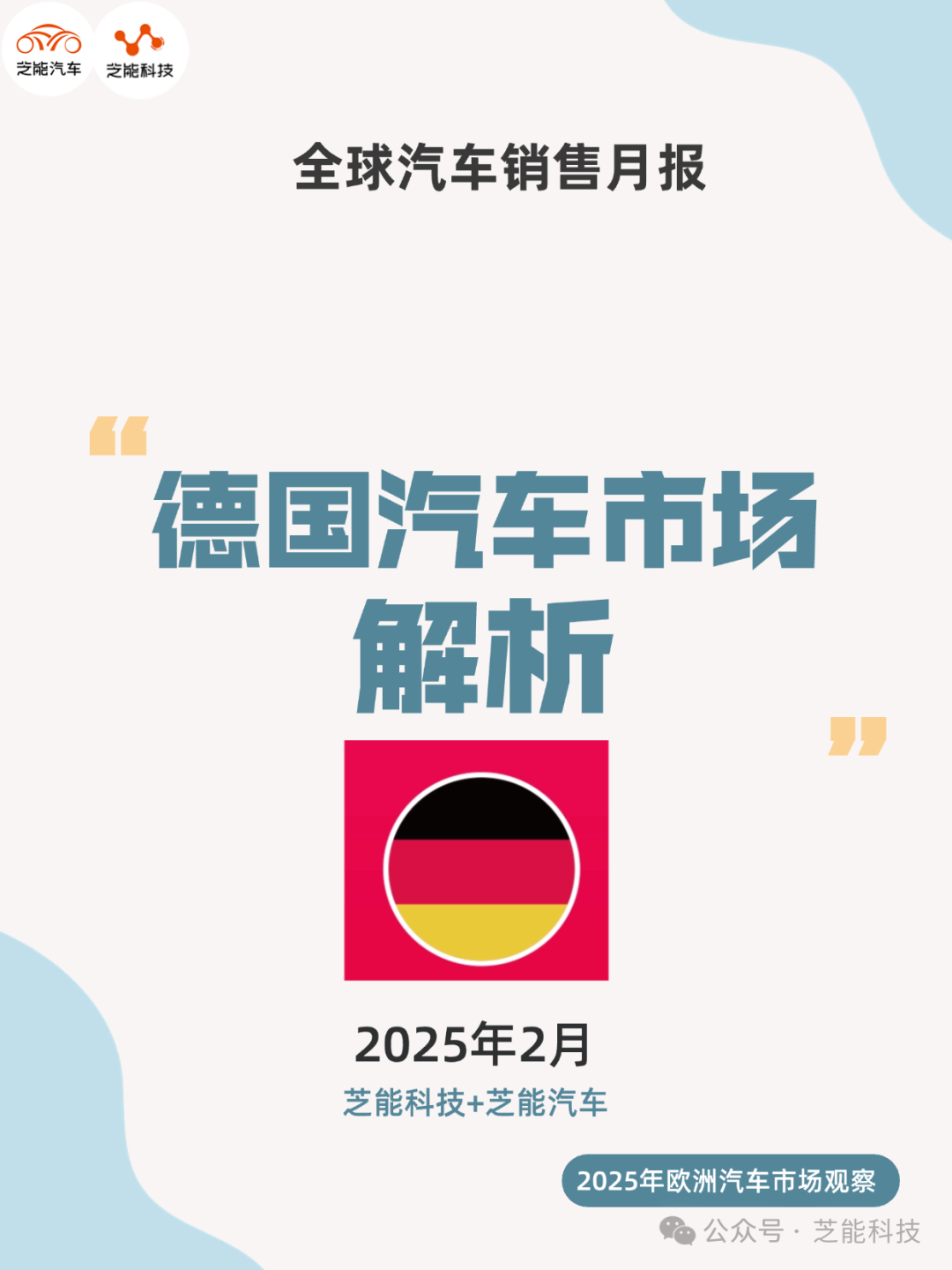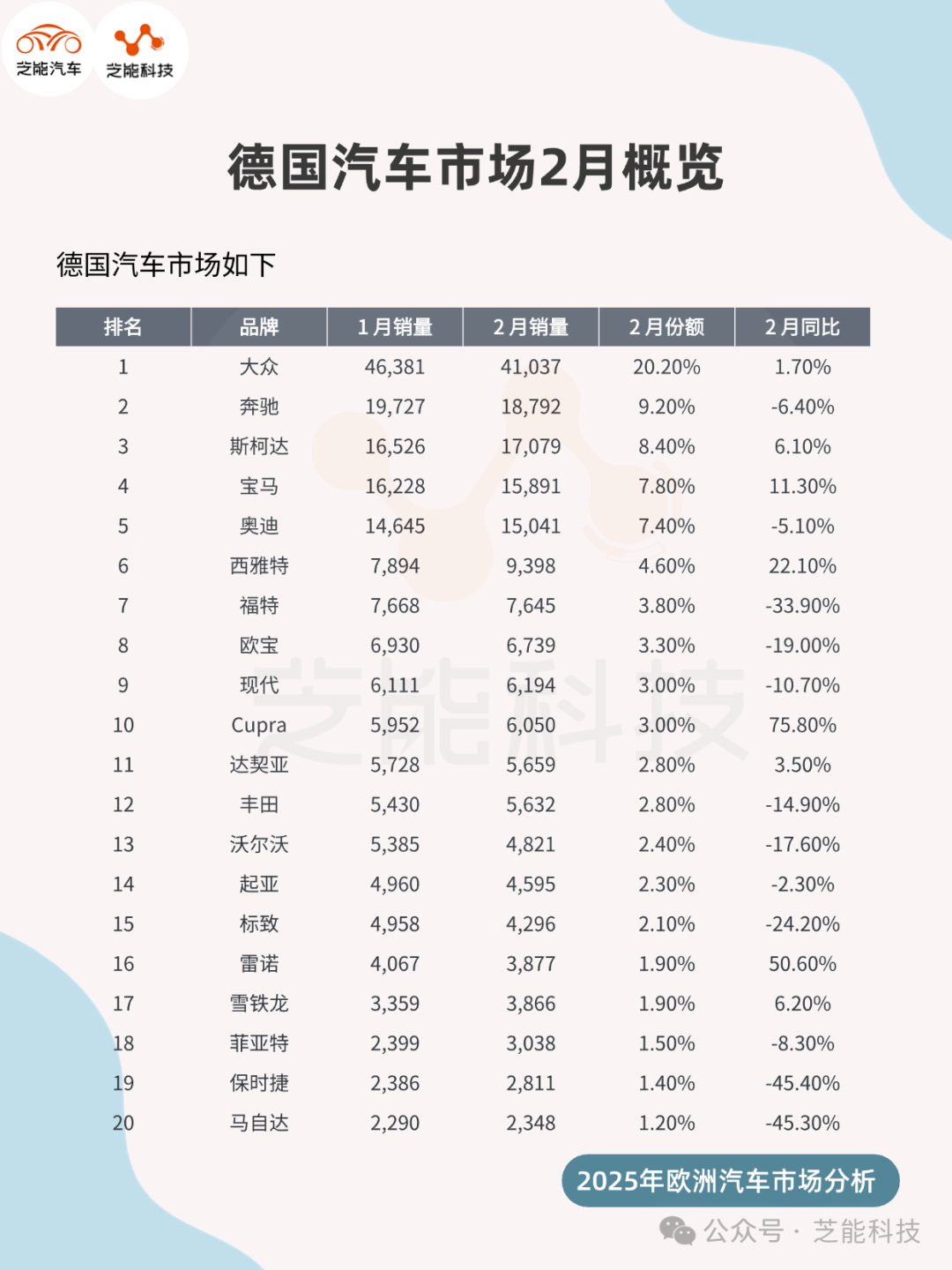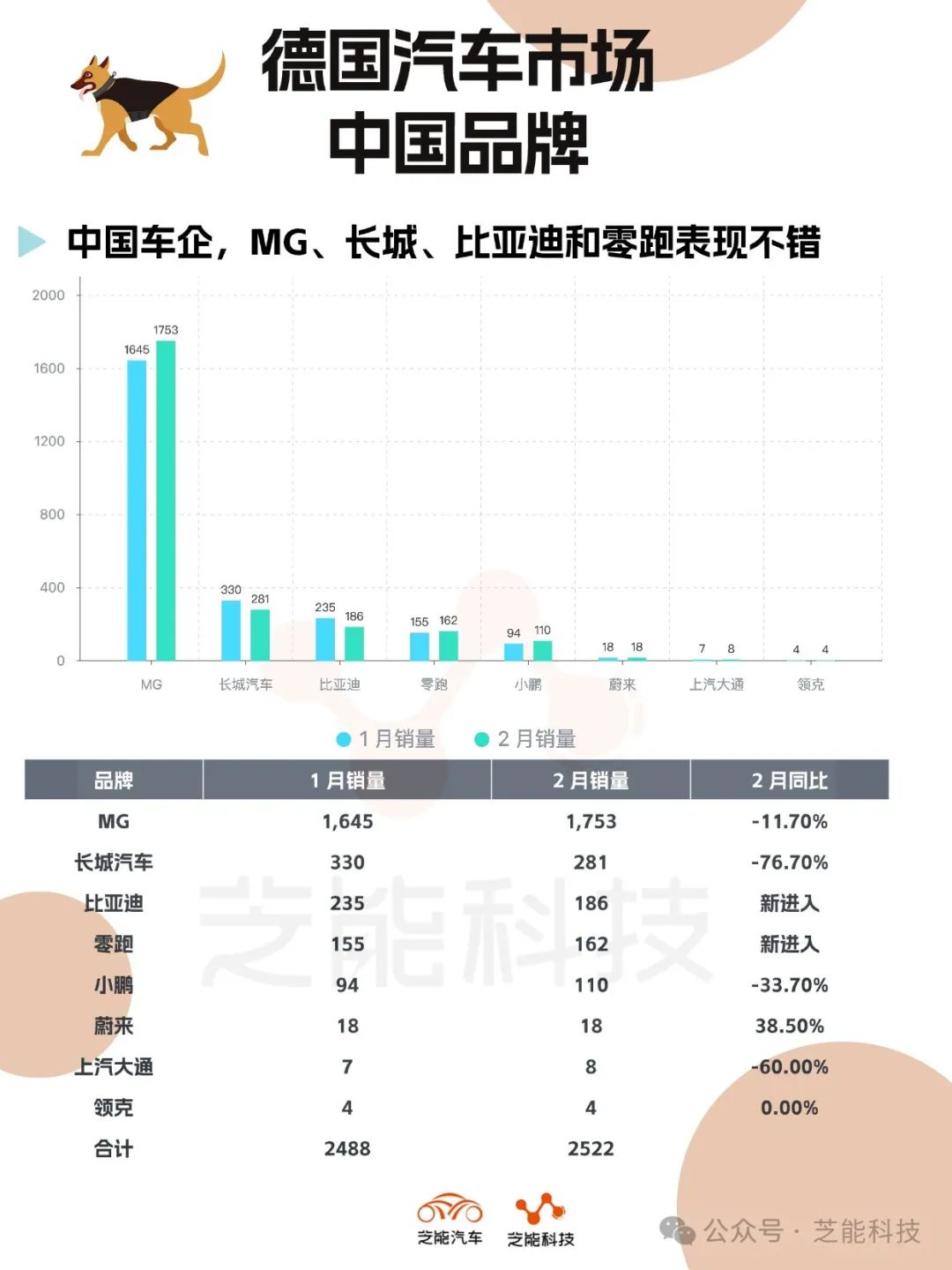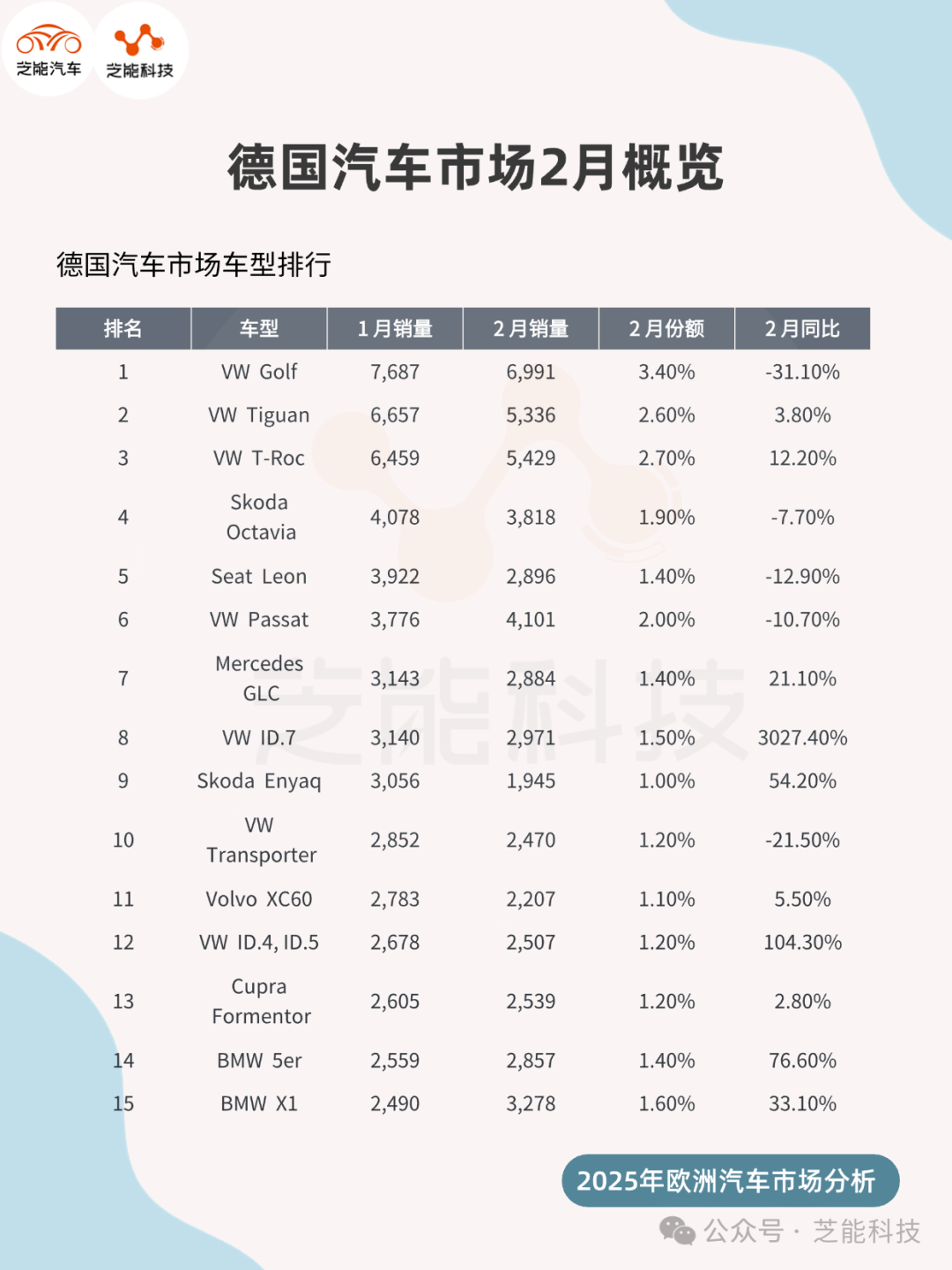European Auto Market | Germany 2025: Volkswagen EVs Soar Amidst Market Trends, Tesla Faces Setback
![]() 03/17 2025
03/17 2025
![]() 492
492

In February 2025, new car sales in Germany declined by 6.4% year-on-year to 203,434 units, with cumulative sales of 411,074 units since the start of the year, down 4.6% year-on-year.
Amidst the sluggish overall market, sales of pure electric vehicles (EVs) bucked the trend, rising by 30.8% to 35,949 units, with their market share climbing to 17.7%. This underscores the relentless progression towards electrification.
Volkswagen led the market with a 20.2% share, its electric models performing exceptionally well. Meanwhile, Tesla sales plummeted by 73.3%, leaving it with a mere 0.7% share and losing its former prominence. Traditional brands such as BMW and Audi witnessed robust growth, while Chinese brands maintained stable overall sales but exhibited varying performances.
This article delves into the latest developments in the German market, analyzing sales overview and competitive landscape to reveal profound shifts in electrification and brand dynamics.
01
Germany February 2025 Sales Overview

In February 2025, new car sales in Germany totaled 203,434 units, a 6.4% year-on-year decrease, with cumulative sales of 411,074 units since the beginning of the year, down 4.6% year-on-year. This decline reflects the impact of economic uncertainty and waning consumer confidence.
● From the Perspective of Powertrains
◎ Pure electric vehicle (BEV) sales surged by 30.8% year-on-year to 35,949 units, with market share jumping from 12.6% in the same period last year to 17.7%, emerging as a market highlight;
◎ Gasoline car sales fell by 26.2% to 56,911 units (28% share);
◎ Diesel car sales declined by 23.8% to 32,116 units (15.8% share);
◎ Hybrid vehicles (including plug-in hybrids) increased by 12% to 77,687 units (38.2% share);
◎ Plug-in hybrid models grew by 34% to 19,534 units (9.6% share).
The German market is accelerating its transition towards new energy vehicles.
● In terms of brand sales
◎ Volkswagen retained its top spot with 41,037 units sold, a 20.2% market share, and a 1.7% year-on-year increase, showcasing its robust market foundation.
◎ Mercedes-Benz ranked second with 18,792 units (9.2% share) but fell by 6.4% year-on-year, mirroring market performance.
◎ Skoda (17,079 units, 8.4%), BMW (15,891 units, 7.8%), and Audi (15,041 units, 7.4%) occupied the third to fifth positions, with BMW and Audi posting 6.1% and 11.3% growth, respectively, outpacing the market average.
◎ SEAT (9,398 units, 4.6%) and Ford (7,645 units, 3.8%) recorded growth of 22.1% and -33.9%, respectively, with Ford experiencing a rare double-digit decline.
◎ Opel (6,739 units, 3.3%), Hyundai (6,194 units, 3%), and Cupra (6,050 units, 3%) occupied the middle ranks, with Cupra's 75.8% increase standing out.
● Chinese brands in the German market are noteworthy, with total sales of 2,522 units, a slight increase from 2,488 units in January.
◎ MG led Chinese brands with 1,753 units sold, despite a 11.7% year-on-year decrease, indicating a solid market presence.
◎ Great Wall Motors sold 281 units, a steep 76.7% year-on-year decline, signaling weak performance.
◎ BYD (186 units) and Zero Run (162 units) maintained stable performances as new entrants.
◎ Xiaopeng (110 units) fell by 33.7%.
◎ NIO (18 units) grew by 38.5% but from a small base.
◎ SAIC MAXUS (8 units) and Lynk & Co (4 units) reported weak sales.
Overall, Chinese brands accounted for approximately 1.24% of market share, and while they have yet to make a significant impact, they hold potential in the electric vehicle sector.

02
Model Sales and Competitive Landscape
● Regarding specific model sales, Volkswagen exhibited strong dominance, with the top four models all belonging to the brand.
◎ The Golf ranked first with 6,991 units sold (3.4% share), maintaining its leadership despite a 31.1% year-on-year decrease.
◎ The T-Roc (5,429 units, 2.7%) and Tiguan (5,336 units, 2.6%) increased by 12.2% and 3.8%, respectively, taking the second and third spots.
◎ The Passat (4,101 units, 2%) fell by 10.7% to fourth place.
◎ The Skoda Octavia (3,818 units, 1.9%) dropped by 7.7% to fifth place.
◎ The BMW X1 (sales not specified but ranked sixth) grew by 33.1%, underscoring the appeal of luxury electric SUVs.
◎ The Opel Corsa (sales not specified, ranked seventh) fell by 6.1%.
◎ The Volkswagen ID.7 surged to eighth place with 2,971 units sold (1.5%) and an astonishing 3,027.4% year-on-year increase.
◎ The Skoda Enyaq (1,945 units, 1%) increased by 54.2% to ninth place.
◎ The Volkswagen Transporter (2,470 units, 1.2%) declined by 21.5% to tenth place.
◎ The explosive growth of electric models such as the ID.7, ID.4/ID.5 (14th place, up 104.3%) and ID.3 (23rd place, up 130.3%) highlights Volkswagen's formidable position in the electric vehicle market.

● From a competitive landscape perspective, the German market is undergoing a brand reshuffle fueled by electrification.
◎ Volkswagen, with the success of its ID series, has not only fortified its advantages in traditional fuel vehicles but also mounted a counterattack in the electric vehicle sector, filling the void left by Tesla's plummeting sales (from a 2.8% share last year to 0.7%).
◎ Tesla's decline is intrinsically linked to Elon Musk.
◎ BMW and Audi achieved growth through electric models such as the X1 and Q4 e-tron.
◎ Skoda and SEAT rely on cost-effectiveness and group resources to maintain their positions, while Ford and Cupra's growth signals the potential of niche markets.
◎ Although Chinese brands like MG and BYD have highlights, their overall competitiveness is constrained by brand recognition and channel layout, preventing them from challenging the dominance of mainstream brands.
Policy support for electric vehicles and evolving consumer preferences will continue to propel the market towards new energy, but the technological depth and market foundation of traditional brands remain dominant.
Summary
In February 2025, the German automotive market exhibited dual traits of accelerated electrification and brand differentiation. Despite an overall sales decline of 6.4%, the 17.7% market share and 30.8% growth of pure electric vehicles demonstrated robust momentum.
Volkswagen consolidated its leading position with the surge in electric model sales, while Tesla's 73.3% sales decline exposed its vulnerability amidst intensifying competition. Although Chinese brands have made strides, their penetration remains limited, and it will be challenging for them to shake the dominance of German brands in the short term.







